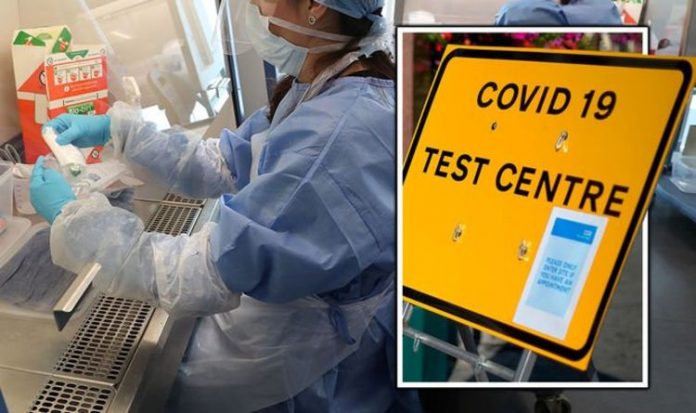Express.co.uk has seen emails from someone who had a coronavirus test with the results coming back negative. But, shortly after, the female, simply known as Ellie, received a second email telling her there wasn’t enough data and was asked to return for a second coronavirus test. Confusingly, in the second email, it was not addressed to ‘Ellie’ but instead to ‘Ella’ – the incorrect name.
How is Boris Johnson handling the coronavirus crisis? Vote in our poll
Entitled ‘COVID retest required’, the inconclusive test result email, read: “Dear Ella. We have received notification from the lab today that your test did not meet the minimum data set.
“Therefore, I will need you to come and get another test as soon as you can please?
“You can come anytime between 9am-4.30pm and I will let the staff know to expect you.
“Please let me know when is convenient and if you need anything in the meantime, just let me know.”

Coronavirus latest: Test retsuls are being sent to the wrong people (Image: GETTY)

The email was not addressed to ‘Ellie’ but instead to ‘Ella’ – the incorrect name (Image: EXPRESS)
Ellie later received another email, asking she ignore the inconclusive test results message because it had been sent in error and was referring to someone else.
This email, simply entitled ‘Error’, read: “I’ve just checked the file again and it appears there is someone very close to your name but the results do not relate to you.
“If you have not had your results, or they have come back inconclusive, please let me know.”
No other data was shared in the email sent in error.
READ MORE: Coronavirus map LIVE: Emergency powers EXTENDED

Coronavirus latest: Ellie later received another email, asking she ignore the first message telling her to go back because they had sent it to the wrong person (Image: EXPRESS)
Responding, a Department of Health and Social Care spokesperson said: “NHS Test and Trace is processing tests at an unprecedented scale – 225,000 a day on average over the last week – and the vast majority of people going through the system do not experience any problems.
“The tests are reliable and effective, which has been backed by the opinions of health experts, independent inspectors and international peer-reviewed evidence, and all tests are assessed as performing to manufacturer’s specifications before being used.”
This is the latest example of the wrong people being contacted regarding testing.
Earlier this year, former Labour Party MP Emma Dent Coad said it was “outrageous” coronavirus test results for a woman in Wales were sent to her instead.
DON’T MISS
Coronavirus cases: Are cases doubling? Prof Whitty reveals updates [ANALYSIS]
James Middleton takes cheeky swipe at Boris Johnson in Instagram post [COMMENT]
Coronavirus symptoms update: Signs of virus in the nose [ADVICE]

Coronavirus latest: Testing in the UK has come under heavy scrutiny (Image: GETTY)

Coronavirus latest: Boris Johnson has faced intense criticism over COVID-19 testing (Image: GETTY)
The former MP for Kensington and Chelsea between 2017 and 2019 had been shielding since before nationwide lockdown measures were enforced in March, but had not had a coronavirus test as she was not leaving her house.
But she was sent the results for a 70-year-old woman by text message from NHS Wales.
Ms Dent Coad said the message in English and Welsh included the name and date of birth of the person who had the test.
The coronavirus test results were negative, but the message said it could not conclusively rule out a COVID-19 infection.

UK coronavirus map live (Image: EXPRESS)
The former Labour MP, who is still a councillor, said at the time: “It’s a breach of GDP, it’s outrageous. It’s not ok.
“Why would NHS Wales have my number? I’ve got the name and the date of birth of the person in Wales now.
“They say it’s not a breach of GDPR. Yes it is. It is very, very serious.”
She added: “I could do anything with that if I was a bad person.”
Dr Keith Reid, Swansea Bay University Health Board’s Director of Public Health, apologised for the administrative error and any distress it may have caused.
He said: “We are treating this as a serious incident and are managing it in line with Information Governance regulations.
“We will also consider any potential actions to minimise the risk of something similar happening in future.”
Dr Reid attempted to explain the error, and added: “An incorrect digit was recorded when the details of the patient’s telephone number were taken, which then resulted in the result being texted to Ms Dent Coad’s mobile phone in error.”







